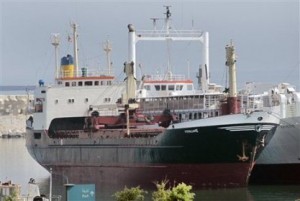Tripoli, 7 May:

An unnamed Libyan man has been accused of international arms smuggling at military court in Lebanon following the capture . . .[restrict]of ship Lutfallah II which was discovered to be carrying arms said to be for the Syrian opposition. Another 20 men have also been charged by the Commissioner of the Lebanese Government, Saqr Saqr. They all accused of purchasing, packaging, and shipping large quantities of weapons and ammunition from Libya to Tripoli, Lebanon, in order to carry out acts of sabotage. Some of these charges, if proven, could carry the death penalty. Among the accused are also persons of Syrian, Lebanese, Egyptian and Indian nationality.
The Lutfallah II was intercepted on 27 April by the Lebanese navy off the Batroun coast. The vessel was impounded at the port of Selaata. Onboard the ship were three containers of weapons, marked as having originated in Libya.
It is believed that the weapons were intended for the Syrian opposition. Lebanon has not supported military intervention in Syria, a stance which extends to relations with Syrian opposition political and military groups, including the arming of the latter.
The Lebanese Defense Minister, Fayez Ghosn, said in a statement that “investigations into the seized shipment of the smuggled weapons will continue until all those involved in this case are caught and punished.” He stressed that the investigation must be allowed to take its course and that any attempt to mislead or interfere with the ongoing investigations will not succeed. He further stated that the investigation must be conducted properly and not rely on speculations and analysis.
“The issue should not be the subject of political speculation,” he said on Friday.
A number of Libyan fighters are known to have joined the Libyan opposition. There are also unverified claims from individual Libyans to have smuggled arms in recent days on fishing boats from Libya to Lebanon for the opposition in Syria, in much the same way that arms were shipped in to Misrata from Benghazi during last years’ revolution.
Support in Libya for the uprising against the Assad regime in Syria is very strong. The Libyan authorities have broken relations with the regime and recognised the opposition Syrian National Council (itself modelled on the NTC), providing humanitarian aid to it. But they have ruled out providing it with arms or other military support.
In March, following Russian accusation that Libya was doing precisely that, Prime Minister Abdurrahim emphatically denied it, saying he was unaware of any such support.
[/restrict]








